
Karen Read ABC 20/20 Special Was A "D+" Rating At Best
9/7/24 - Brian Bardsley
Last night the world was waiting to hear Karen Read speak for the first time in a NEW ABC 2020 speical report since her mistrial on July 1st. I had my first initial thoughts just after watching the episode but after taking some time to reflect here are my final impressions:
Let me first start by this. The fact that this was a mainstream media organization presenting this special, it was unrealistic to expect this segment to fully support Karen’s position. Mainstream media tends to edit content in a way that often skews against those accused. We’re all aware of the critical details that were omitted from the segment.
Positives:
1. Turtleboy’s Mention: The segment referenced Turtleboy, which may drive viewers to learn more about his efforts in uncovering the truth about the case.
2. Karen’s Testimony: Karen presented herself as articulate, sincere, and emotionally engaged, offering viewers a personal glimpse into her side of the story.
3. Stimulating Discussion: As Rita noted during my live, the special has sparked conversation, potentially leading more people to investigate the case further and support the Free Karen Read movement.
Negatives:
1. Bias Toward the O’Keefes: The segment heavily favored the O’Keefes’ perspective, neglecting to include viewpoints from Karen’s family or friends.
2. Omission of Key Details: Important aspects such as the cover-up, tampered evidence, butt dials, and dog bites were left out. The episode could have been more balanced by incorporating the defense's perspective.
3. Lack of Mention of Federal Investigation: There was no discussion of the ongoing federal investigation, a significant element of the case.
While the 2020 segment provided some insight into Karen Read’s perspective and highlighted certain issues, it didn’t fully present a balanced view. Important details were left out, and the defense’s side wasn’t explored in depth. For those interested in understanding the case more thoroughly, this episode might be more of an introduction rather than a complete analysis of Karen Read’s situation.
Overall I gave it a D+ rating at best.
Take a look at our watch party from last night in the article attached. You can sync the video and enjoy it on your TV while following along with our reactions.
Please consider clicking on the LinkTree link to support my as an independent journalist: LinkTree
Disassociated Friend Tells Me That His Cop Friends: "Know Who I Am And Where My Mother Lives..."


9/4/24 - Brian Bardsley
Here’s an interesting story: While I was at Target today, I ran into an old friend I haven’t seen in nearly a year due to our busy schedules and various life events. After catching up briefly, he suddenly said, "Hey, I’m sorry for blocking you on Facebook." The funny part was, I didn’t even know he had blocked me since I rarely check my friends list. I replied, "Oh, did you? I didn’t even notice."
He then asked how my YouTube channel was going, and I told him it was great. He went on to explain, "Yeah, I had to block you because of your stance in the Karen Read movement. I had a few law enforcement friends reach out to me, warning me to 'be careful of that guy (me).'" I asked him what he meant by that. He said they "know everything about you, where you live, and where your mother lives." I responded, "Is that supposed to scare me? What do you mean, 'They know everything about me'? There’s nothing to know, and I’ve been here for a year soooo..."
As I was about to leave, he wrapped up our conversation with, "You’re not going to convince me, and they’ll get her (Karen Read) next time." Now, I think back to the beginning of our conversation. This was the very moment my friend could have grown some balls and shown some loyalty as I’ve known him for over 20 years by standing up to these "cop friends" and telling them to piss off instead of caving in and siding with them. And the idea that they would threaten my 72-year-old mother and dig into her personal life is appalling. You want to come at me fine but DON’T THREATEN MY FAMILY! These people will stop at nothing, but their attempts to intimidate me will only make me push harder and speak louder. Fuck You, Bring it on—I’m not going anywhere! Free Karen Read!
Update: You can see the text from this ex friend below that was sent to me a few hours after I posted this article below.
P.S. – You all did an amazing job on Labor Day during the Free Karen Read standouts. It shows a lot about your character that you would sacrifice a holiday to stand out and fight for justice. The waves you created across the world were inspiring to so many! Keep up the good work.
Please consider supporting independent journalism: LinkTree


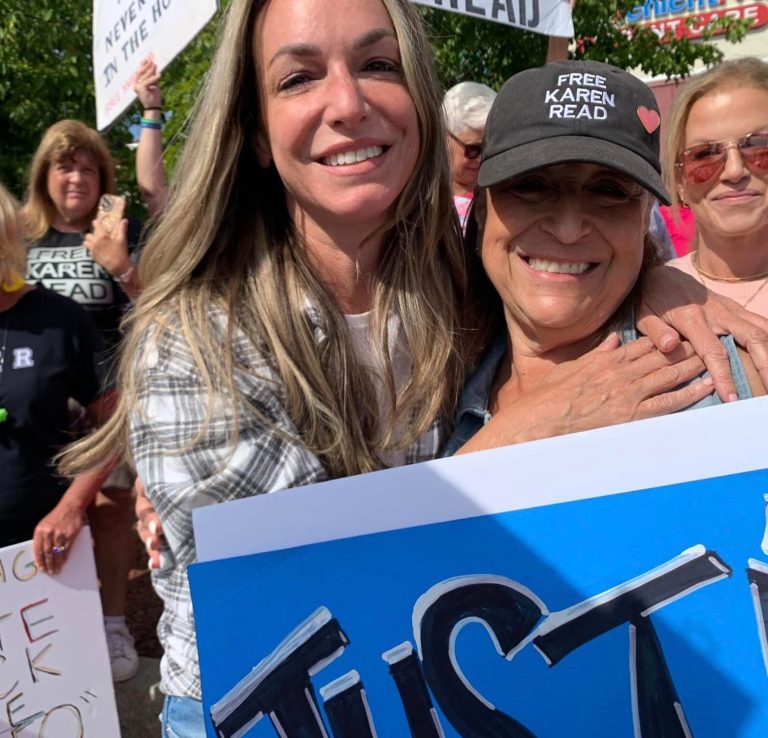




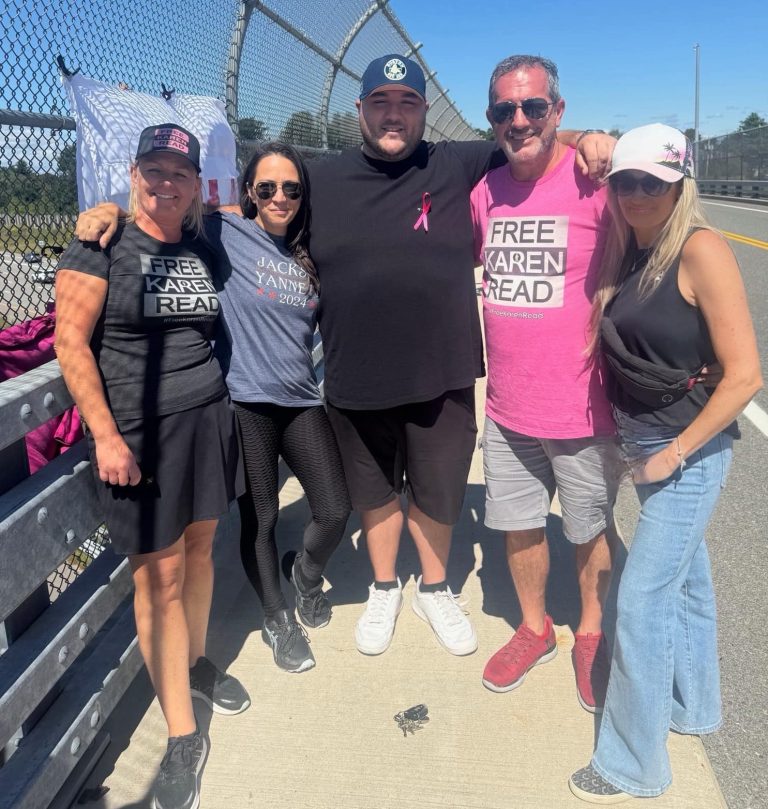
Free Karen Read Labor Day Nationwide Standout
9/2/24: Brian Bardsley
Today marks a pivotal moment as we take a stand against corruption in Norfolk County, Massachusetts. With the powerful call to "Free Karen Read" resonating nationwide, our movement gains momentum.
For those who can't join us in person, I'm offering two live streams to ensure everyone has the chance to participate and stay informed. These Live feeds will provide a real-time look at our efforts and allow you to be part of the action, no matter where you are.
Join us as we make our voices heard and advocate for justice. Let’s unite and shine a light on the issues affecting our community.
Links to my LIVE feeds.
10 AM Live Feed: FREE KAREN READ
2PM Live Feed: FREE KAREN READ

Strength and Determination: The Core of Karen Read’s Fight

8/29/24: Brian Bardsley
On Tuesday I had the privilege to sit down and meet Karen Read along with Dave Cullinane from Barstool Sports at a local restaurant. Our discussion provided valuable insights into Read's demeanor and her steadfast determination in her ongoing legal struggles.
Given the extensive details shared and the recent civil lawsuit filed by the O'Keefe family on August 26th, I will refrain from disclosing any new information about her case out of respect for Karen and to ensure the integrity of her legal battles.
Read, 44, faces charges for allegedly striking John O'Keefe with her SUV and leaving him in a snowstorm in January 2022. Her two-month trial ended in July when jurors could not reach a verdict, leading the judge to declare a mistrial on the fifth day of deliberations due to a deadlocked jury.
Karen Read stands out for her clarity and focus. She is blunt and direct, engaging with a sharp intellect and exceptional attention to detail. I was particularly struck by her ability to retain and recall information, which underscores her meticulous approach and unwavering commitment to her case.
Throughout our discussion, Read was open and unreserved, addressing every question I had about the January incident without hesitation. She described her interactions with John that night as “no different from any other typical outing,” implying a normalcy to their relationship that challenges allegations against her.
She explained that on the night she dropped John off at Brian Albert's residence at 34 Fairview in Canton, MA, he exited her SUV and approached the side door. After waiting for about 10 minutes without receiving any signal or text from him, she became frustrated and decided to leave and drive back to O’Keefe’s home. Sadly, the rest of this story we already know… Corrupt law enforcement and a bunch of low-class Canton residences will orchestrate an elaborate frame job to ensure Read goes down for John’s death.
As our conversation progressed throughout the evening, I was shocked about critical case details that were not allowed to be entered into the case and were being held back by ADA Adam Lally and Judge Beverly Cannone. This revelation has added a layer of deep complexity to her case and in my opinion this critical information that was left out would have helped Read’s case tremendously.
As a potential retrial in January 2025 approaches, Read discussed her primary goals for the future. She believes that gaining a wider public understanding of her situation is essential for building broader support. This drive for increased visibility is further supported by the upcoming Vanity Fair article about her case, set to be published in December, which she hopes will amplify her story. I also suggested that she consider appearing on larger platforms, such as the Joe Rogan Experience podcast. Given its 5.44 billion views, I believe it would be an ideal venue to share her story with a global audience.
As we wrapped up our conversation Read expressed gratitude for the support she has received from the “Free Karen Read” movement, particularly highlighting the contributions of Aidan “TurtleBoy” Kearney, who played a pivotal role in bringing attention to her case in April of 2023. This support has been instrumental in maintaining her resolve and pushing forward with her legal battle.
In summary, Karen Read's case stands out for her resolute determination and strategic efforts to publicize her story. Despite the significant challenges she faces, her strength and directness remain central to her approach. As she continues to navigate the complexities of her legal battles, her unwavering resolve will undoubtedly keep her from backing down against anything thrown her way. Her resilience and refusal to be intimidated, despite the hurdles, serve as a powerful testament to her character and commitment to confronting her charges head-on.
As Karen Read's legal battle approach she needs our help more than ever. Please consider making a donation to her legal defense fund by clicking on the "Free Karen Read" button in this article.
Thank you B~

Judge Cannone Rules on Motion to Dismiss
Counts 1 & 3 in Karen Read Case: Denied!
8/23/24: Brian Bardsley
Judge Beverly Cannone has rejected Karen Read's request to dismiss two charges against her. The judge stated that since Read was not acquitted and the mistrial was agreed upon by her defense, double jeopardy does not apply. The Norfolk County District Attorney’s office supports the judge’s decision, noting it aligns with longstanding legal precedents and plans to proceed with the trial starting January 27.
Attorney and legal commentator of the Karen Read case Mark Bederow in a tweet Friday morning states:
"The Friday decision puts the onus and pressure on the DA (for now) to deal with the fiasco created by the apparent literal fact that Karen Read was acquitted of murder. The charge is obviously flawed. It is an obvious overreach. And most importantly, every potential juror at a possible retrial "knows" she was acquitted on 2 of 3 counts. Is this DA foolish enough to face all of this with a straight face going forward? To do so will sacrifice whatever credibility they have left in this matter. "
Mark has recently joined Aidan "Turtleboy" Kearny's legal team to challenge the witness intimidation charges brought by Norfolk County DA Michael Morrissey. These charges stem from Kearny's exercise of his First Amendment rights during a rolling rally in Canton, MA, in July 2023, where he voiced his concerns about the charges against Karen Read.
As the legal battles continue, both sides will navigate a landscape shaped by legal precedents, public scrutiny, and strategic maneuvering. The coming months will be pivotal in determining the outcome of these intertwined cases and the broader implications for all parties involved.
We will continue to fight! FREE KAREN READ!
Support this article: LinkTree
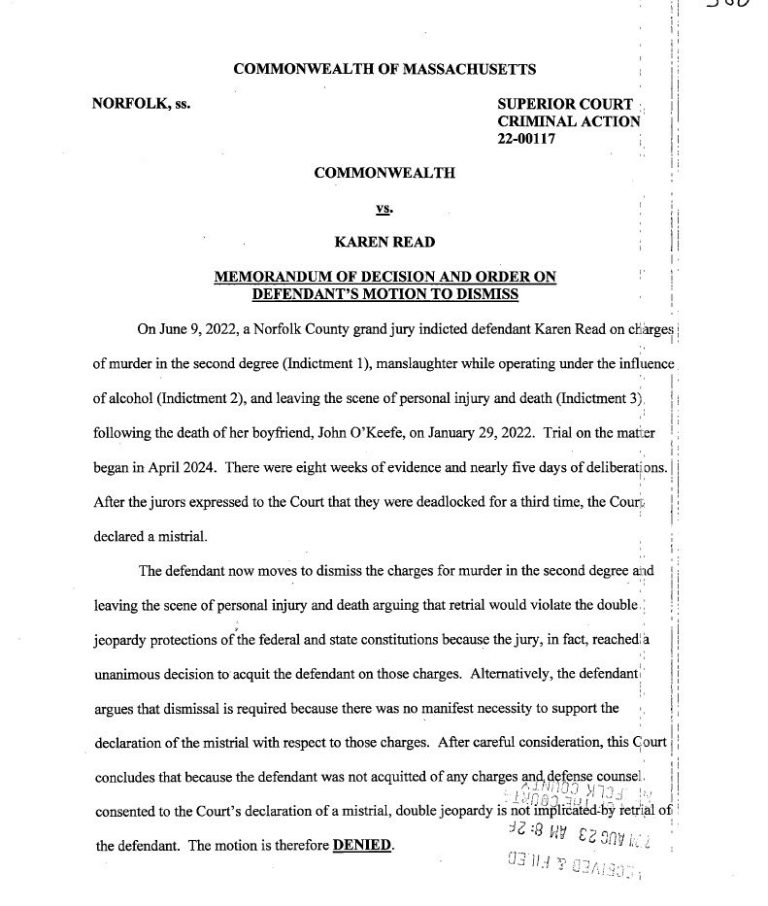
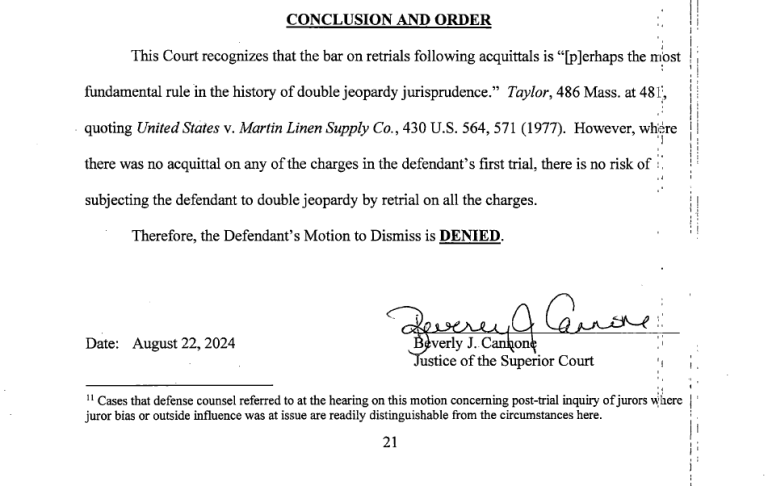
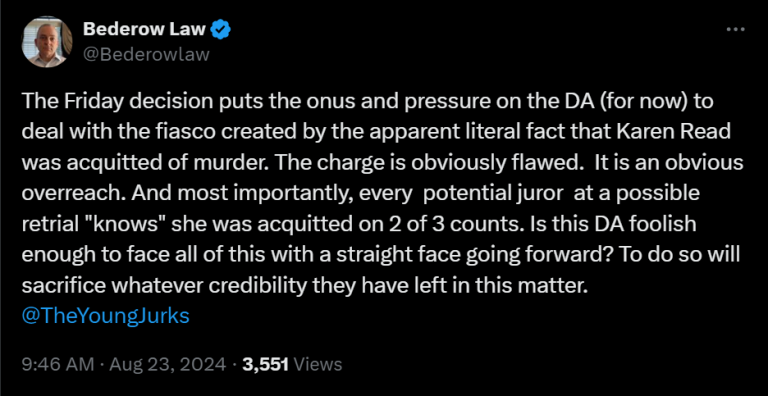

Karen Read Throws Up The Bat Signal To The World via Personal Facebook Profile
8/21/24
Around 11:00 am EST, Karen Read updated her personal Facebook profile picture to an image of a letter from the US Attorney's Office on August 23, 2023, to the Norfolk County DA's Office. The letter states that the federal investigation will continue and highlights a "very different opinion" on the Read case compared to Michael Morrissey's. Could this suggest that Karen is aware of information we’re not privileged too, or it could be a response to her frustration waiting for a decision about her filed Motion to Dismiss a second trial in a status hearing on August 9th. Even though Judge Cannone has not ruled on that motion she proposed January 14, 2025, for a pretrial conference and January 27, 2025, as the new trial date. This does not change anything as Karen Read still remains factually innocent and that this sham of a trial needs to stop. B~
Support Independent Journalism: LinkTree



ATF Agent Brian Higgins Attempted to Muscle Local Cape Cod Gun Store
8/21/24
A new chapter has unfolded in the Karen Read case, revealing a disturbing incident from a few years ago at Cape Cod Gunworks. The controversy centers around ATF Agent Brian Higgins, whose aggressive tactics during an investigation have sparked significant criticism and concern over government overreach. Higgins visited the gun store, now owned by Toby Leary, to probe into a police academy student’s illegal purchase of a Glock pistol. This troubling episode was recently brought to light when Leary shared his account on a recent episode of The Sons of Liberty Podcast on YouTube.
(The Brian Higgins segment starts at 52:30 in the episode)
The Incident
The visit began with Higgins seeking to obtain a 4473 form, a crucial document in firearm transactions. While at Cape Cod Gunworks, Higgins observed a woman purchasing a firearm and her boyfriend's brief interaction with her. He suspected this interaction might be indicative of a "straw purchase," a scenario where someone buys a gun on behalf of another person who is legally prohibited from owning one.
Higgins’ attempt to probe further into the transaction was met with resistance from the store. Leary, concerned about the scope of Higgins' inquiry, contacted their legal counsel. The lawyer promptly intervened, advising Higgins that without a warrant or subpoena, the store was under no obligation to provide the 4473 form. Despite this, Higgins proceeded to enter the manager’s office and obtain the form without permission.
Escalation of the Situation
The situation escalated when Higgins returned to Cape Cod Gunworks armed with a grand jury subpoena demanding access to the store’s video surveillance system hard drive. In an unexpected move, Higgins ordered the shutdown of the entire store and seized the server, an action that has been described as excessive and intrusive.
Critics argue that Higgins’ decision to seize the server rather than request records for a specific day reflects a disregard for procedural norms and an overreach of authority. The controversy has been further fueled by Higgins’ instruction to Ly that he should have contacted his general manager, a suggestion perceived as dismissive and condescending.
Public Reaction and Concerns
The incident has sparked a strong reaction from various quarters, with many condemning Higgins' actions as an abuse of power. Critics draw parallels to other high-profile cases, such as the Karen Read case, to highlight what they see as a disturbing trend of overbearing law enforcement practices. The speaker and others in the community believe that Higgins' behavior exemplifies a broader issue of governmental overreach and the erosion of civil liberties.
The situation at Cape Cod Gunworks serves as a stark reminder of the tension between law enforcement authority and individual rights. As investigations into the incident continue, the broader implications for both legal procedures and the relationship between citizens and law enforcement remain a critical concern.
Support this article here: LinkTree
Subscribe to The Sons of Liberty Podcast: https://www.youtube.com/@TheSonsofLibertyPodcast

Karen Read Case: Retired Veteran Massachusetts State Trooper Todd McGhee
Summary: Minutes That Matter 8/17/24
This evening, I had the privilege of hosting Retired Veteran Massachusetts State Trooper Todd McGhee, whose distinguished career spans significant achievements in law enforcement and security training. After serving for 24 years with the Massachusetts State Police, including a pivotal role at Logan International Airport, Todd retired in 2011. Following his retirement, he co-founded Protecting the Homeland Innovations, LLC (PHI, LLC) in 2003, where he created and developed the P.A.T.R.I.O.T. Training System® and the S.A.V.E. Methodology™, both endorsed by the Department of Homeland Security. His innovative contributions have been featured in Time Magazine and on ABC Nightline, and he serves as a Homeland Security expert on Fox 25 News. Todd’s global training efforts underscore his role in representing the U.S. in the fight against terrorism.
Addressing Police Misconduct and Scandals: An In-Depth Analysis
Recent issues of police misconduct and scandals have brought systemic problems in law enforcement to the forefront, sparking calls for comprehensive reform. This article explores notable instances of misconduct, accountability challenges, and the urgent need for improved training and community relations.
Sonya Massey and Ongoing Police Misconduct
Todd sheds light on the Sonya Massey case, highlighting Sean Grayson's troubling career pattern as an example of significant flaws in handling police misconduct. Despite a history of infractions, Grayson repeatedly moved between departments, often by "retiring" before being rehired elsewhere. This practice has allowed problematic officers to escape accountability and continue their service in new jurisdictions.
In Massachusetts, misconduct is tracked by a Brady list managed by the Massachusetts Municipal Police Training Council, aimed at preventing officers with a history of misconduct from remaining in law enforcement. Nevertheless, scandals such as bribery, drug mishandling, and overtime fraud have affected the Massachusetts State Police, revealing deeper issues of corruption and ethical breaches.
Similarly, the New Jersey State Police faced severe scrutiny for racially profiling motorists, resulting in lawsuits and federal oversight. These incidents underscore systemic issues that go beyond individual misdeeds and indicate broader institutional failings.
The Karen Read Case: Investigative Failures
In the second part of our discussion, Todd delves into the Karen Read case, demonstrating how investigative errors can compromise justice. The crime scene suffered from contamination due to improper evidence collection and witness management before the state police's arrival. Key evidence was mishandled, and crucial witness interviews were delayed. Discrepancies between testimonies and forensic reports suggested significant flaws in the investigation.
Todd points out that key witnesses, Brian Albert and Brian Higgins, destroyed phones vital to the investigation without facing apparent consequences, despite internal and federal inquiries. Additionally, independent reconstructions by experts like Dr. Wolfe and Dr. Rentschler contradicted the prosecution’s narrative, raising questions about the investigation's integrity. The mishandling extended to the processing of Karen Read’s vehicle, which should have been managed by the Massachusetts State Police crime lab, not the Canton Police Department.
Reforming Police Training, Accountability, and Community Relations
Todd shares his perspectives on reforming police departments and holding officers accountable. The increasing number of misconduct cases has intensified the call for reform. Staffing shortages and reduced hiring standards have led to the inclusion of individuals with questionable backgrounds, highlighting the need for effective psychological testing and periodic evaluations.
Training is another critical area for reform. The growing reliance on technology in policing has reduced face-to-face interactions, impacting trust and understanding between officers and communities. This digital shift, exacerbated by social isolation during the COVID-19 pandemic, has strained community relations.
Todd emphasizes that rebuilding trust requires embracing external oversight and reforming practices rather than managing issues internally. Police departments should focus on community outreach and diverse recruitment to address the current lack of representation.
Accurate police reporting is crucial, as even minor errors can significantly affect a case’s outcome. In Massachusetts, investigators from the District Attorney's office gather and present evidence, with the DA deciding whether to pursue charges.
Community feedback is vital for addressing grievances against police officers. Citizens should feel encouraged to file complaints, even if they suspect little action will follow. This feedback is essential for accountability and improvement.
Todd is a distinguished gentleman and a dedicated retired police officer who is deeply committed to continuing to upholding the law and serve his community with integrity. It was a pleasure having Todd in my studio, and I look forward to our future conversations. Todd emphasizes that issues of police misconduct and scandals highlight deeper systemic problems within law enforcement agencies. Addressing these challenges necessitates comprehensive reforms in hiring practices, training, and community engagement. By learning from past mistakes and embracing transparency and accountability, police departments can rebuild public trust and ensure that justice is served effectively and fairly.
You can learn more about Todd here: https://www.phitraining.com/team
Support this article: LinkTree

Karen Read Case: Reviewing Trooper Paul's Testimony | w/ Mark Mazza Media & Atty Mark Bederow
Summary: Minutes That Matter 8/16/24
The Karen Read case has garnered significant attention due to its intricate details and the controversies surrounding the expert testimony presented. A key point of contention revolves around the qualifications of Trooper Paul, a state trooper involved in the case, and how they compare to those of the ARCA (Accident Reconstruction and Consulting Associates) experts. This comparison raises critical questions about the credibility of the evidence and the broader implications for the legal proceedings.
Trooper Paul’s Qualifications: An Overview
Trooper Paul, a key figure in the reconstruction of the vehicle-pedestrian collision at the heart of the Karen Read case for the Commonwealth, has faced scrutiny for his qualifications. His formal education is in the administration of justice, with no advanced degrees or specialized training in scientific fields such as mathematics, physics, biomechanics, or engineering. This lack of technical expertise has led to criticism from commentators and legal experts alike.
In his testimony, Trooper Paul exhibited a poor fundamental grasp of kinematics, which is essential for analyzing motion. However, his application of these principles to the incident appeared limited. For instance, his analysis of the vehicle’s speed decrease and steering input lacked the scientific rigor typically associated with expert testimony. This has led to concerns about the reliability and depth of his conclusions.
Comparison with ARCA Experts
In contrast to Trooper Paul, the ARRCA experts bring extensive specialized knowledge to the table. These experts possess advanced degrees and significant experience in physics, engineering, and accident reconstruction. Their ability to conduct detailed analyses of collision dynamics, impact forces, and physical evidence stands in stark contrast to Trooper Paul's general law enforcement background.
The ARRCA experts’ approach is characterized by a rigorous scientific methodology, including precise calculations and evaluations of physical evidence, which enhances the credibility of their analyses. This stark contrast highlights potential shortcomings in Trooper Paul’s testimony and raises questions about the adequacy of his role as an expert witness.
Critiques of Trooper Paul’s Testimony
Several elements of Trooper Paul’s testimony have been subject to scrutiny:
Debris Analysis: Trooper Paul’s identification of debris at the scene as likely road debris rather than a part of the vehicle's tail light has been questioned. His estimation of the debris's travel distance was inconsistent with other evidence, suggesting potential errors in his analysis.
Evidence and Scene Reconstruction: Trooper Paul relied on information from others, such as Lieutenant Gallagher, for marking the scene on a diagram, rather than conducting independent verification. This reliance on secondary sources, combined with his admission of not performing critical tests or observing key evidence firsthand, undermines the reliability of his reconstruction.
Handling of Physical Evidence: Discrepancies between Trooper Paul’s observations and the evidence regarding glass fragments further complicate his testimony. Despite being informed that the glass was from a cup, he did not perform tests to confirm this, nor did he explore other possible explanations.
Implications for the Case
The debate over Trooper Paul’s qualifications and testimony underscores broader concerns about the integrity of expert witness roles. The contrast between his general law enforcement background and the specialized expertise of the ARRCA experts points to the need for stringent standards in evaluating expert qualifications. This issue is particularly significant in cases involving complex scientific evidence, where the accuracy and credibility of expert testimony are paramount.
Debris Field and Impact Analysis
Another critical aspect of the case is the examination of the debris field and the impact analysis. Discrepancies in the location and nature of the debris field have fueled skepticism about the Commonwealth’s theory. The debris field’s spread, described as inconsistent with a typical vehicle-pedestrian collision, raises questions about the collision's impact dynamics.
Trooper Paul Jackson’s testimony regarding the area of impact has been scrutinized, with questions arising about whether the impact point might be closer to a fire hydrant rather than the red plastic piece labeled “B.” Defense Attorney Allen Jackson’s insights, drawing on his background as an aircraft engineer mechanic, have challenged the consistency of Trooper Paul's analysis.
Conclusion
The Karen Read case presents significant challenges related to expert testimony and legal scrutiny. The qualifications of Trooper Paul, when compared to the ARRCA experts, raise questions about the reliability of the evidence and the broader implications for the case. The issues surrounding the debris field, the handling of physical evidence, and the influence of public and media perspectives underscore the complexities involved.
Support this article: LinkTree

Karen Read Case: Reviewing ARCCA Testimony & Addressing "Alternative Theories"
Summary: Minutes That Matter 8/12/24
As the retrial of Karen Read approaches, the courtroom has become a battleground for forensic experts and their testimonies. With the fate of Read, who is accused in a high-profile case, hanging in the balance, the credibility of the expert testimonies presented is under intense scrutiny. In my recent discussion featuring Mark "Mazza" Media shed light on the ongoing debate surrounding the testimonies from ARCCA experts, particularly Dr. Wolf and Dr. Rentschler.
Controversies Surrounding ARCA Expert Testimonies
ARCCA, an organization known for its work in accident reconstruction, has faced criticism from some quarters. A notable critic, identified as "Pleven" from "Yellow Cottage Tales," has questioned the reliability of ARCCA’s reconstruction. Pleven's concerns center on ARCCA's alleged failure to obtain critical vehicle data, which they argue undermines the accuracy of their reconstruction efforts. This, Pleven suggests, may imply that ARCCA’s experts were serving more as defense witnesses rather than impartial evaluators.
Mark from Mazza Media argues that ARCCA provides unbiased and credible testimony. ARCCA’s extensive experience with organizations like the military and NHL, and their high-quality reconstructions, including the use of live dummies for testing, bolster their credibility.
The Role of ARCCA Experts
ARCCA experts, including Dr. Andrew Rentschler and Dr. Daniel Wolfe, have played a pivotal role in analyzing the evidence. Dr. Rentschler, a biomechanical engineer with a robust academic background, and his team focused on assessing whether there was a plausible mechanism for Officer John O’Keefe’s injuries. The expertise of ARCCA’s team is emphasized, with a detailed examination of their methodologies and findings underscoring their commitment to impartiality.
Mark and I noted that the Commonwealth's reliance on Trooper Paul for expert testimony, given his limited expertise, was problematic. This, alongside the $500,000 expenditure by the FBI for crash reconstruction studies, highlights the complexity and high stakes of the case.
The Importance of Visual Evidence
One significant aspect missing from the trial is video reconstruction of the event. Such visual aids could provide the jury with a clearer understanding of the incident. The speaker argues that despite the defense preparing video reconstructions, they were not permitted to use them, possibly due to objections from the Commonwealth.
Examining the Damage and Injuries
The analysis of the damage to the Lexus involved in the incident reveals discrepancies in the prosecution’s theory. I point out points out inconsistencies, such as the lack of significant damage to other parts of the vehicle, and questions the Commonwealth's assertion of a 24.2 miles per hour impact speed. The damage to the tail light, which was shattered but found in relatively close proximity to the accident scene, raises doubts about the accuracy of the Commonwealth's narrative.
Furthermore, Mark goes on to critiques the prosecution's theory regarding John O’Keefe’s injuries. I argue that the tail light’s damage and the nature of the injuries are inconsistent with the impact theory proposed by the prosecution. The absence of more severe injuries or bruising suggests alternative explanations, such as a potential dog attack rather than a vehicular collision.
Expert Testimonies and Their Implications
Dr. Wolfe, a medical expert hired independently of both defense and prosecution, conducted an analysis revealing that the tail light damage was insufficient to cause the injuries sustained by O’Keefe. His impartial analysis, combined with other expert evaluations, suggests that the prosecution’s theory is flawed.
Biomechanical experts have emphasized that the force required to cause the injuries observed would have been significantly higher than what could be attributed to the tail light damage. This has led to a broader conclusion that the injuries were likely not caused by the vehicle in question but possibly by other factors.
Conclusion
The Karen Read trial highlights the critical role of expert testimony in shaping the outcome of high-stakes legal proceedings. As the retrial progresses, the credibility of the evidence and the expertise of the witnesses will remain central to determining the truth in this contentious case.
Karen's case remains a focal point of public and legal scrutiny, with ongoing discussions aimed at uncovering the truth behind the tragic events involving Karen Read and John O’Keefe.
Support independent journalism: LinkTree

I'll Take It Under Advisement...
8/9/24
Summary: Minutes That Matter
Karen Read's legal saga continues to unfold, with significant developments in her case that are drawing intense scrutiny. Read, who is facing serious charges including second-degree murder and leaving the scene of a crash resulting in death, is also contending with accusations of manslaughter while driving under the influence. Here's a comprehensive look at the ongoing proceedings and the various angles of this high-profile case.
Charges and Defense Strategies
Karen Read's defense team is working to have two of the charges against her dismissed. They argue that new revelations from jurors, who have come forward after a mistrial was declared, indicate that the jury had reached a verdict of not guilty on both the second-degree murder and leaving the scene of a crash resulting in death charges. This new information could potentially lead to the dismissal of these charges if the court finds it credible.
In addition to these charges, Read is facing a third charge of manslaughter while driving under the influence. The defense contends that this charge is baseless, pointing out that there is no evidence linking Read's vehicle to an accident or contact with the victim. They assert that the prosecution's case lacks substantial proof in this regard.
Scrutiny of Juror Influence
The hearing has also highlighted concerns about potential external influences on the jury's deliberations. Key to this discussion is Massachusetts State Trooper Michael Proctor, the lead investigator in the case. Proctor's actions and potential biases have come under the microscope, with suggestions that his influence might have swayed the jury's decision.
Five jurors have come forward claiming they voted to acquit Read. This development has prompted the defense to request a hearing to further investigate the jury's decision-making process. The defense argues that if the jury was indeed influenced by external factors or if there was a unanimous vote to acquit on certain charges, those charges should be dismissed.
Prosecution's Position
The prosecution, represented by Assistant District Attorney Adam Lally, has pushed back against the defense's requests. Lally argues that the jury did not return a formal verdict and that seeking details from jurors could undermine the legal process. Lai has also pointed out that the defense did not object to the mistrial when given the chance, suggesting that the defense is now attempting to exploit procedural opportunities after the fact.
The Role of Trooper Michael Proctor
Recent revelations have cast doubt on Trooper Michael Proctor's credibility. Documents obtained by NBC10 indicate that the Norfolk County District Attorney's office had sent a Brady letter to 13 criminal defense lawyers, suggesting potential misconduct by Proctor. These allegations include claims of falsified evidence and negative remarks about individuals under investigation. Such issues raise concerns about the integrity of the investigations Proctor was involved in, including the case against Karen Read.
Double Jeopardy and Legal Precedents
The principle of double jeopardy, which prevents an individual from being prosecuted twice for the same offense after acquittal, is central to the current proceedings. The defense argues that this principle should protect Karen Read from facing a second trial for the same charges if the jury has already reached a verdict of not guilty. They emphasize that any mistrial or retrial must be justified by the prosecution, especially in light of potential jury bias or misconduct.
Legal experts highlight that double jeopardy protections are a fundamental aspect of the criminal justice system. Historical cases, such as Miranda v. Arizona and Gideon v. Wainwright, underscore the importance of these protections and the need for a fair trial process.
The Atmosphere and Public Support
Outside the courtroom, the atmosphere remains charged, with supporters and detractors of Karen Read gathering in significant numbers. Public figures and media personalities, including Aiden "Turtleboy" Kearney and Mark Mazza Media, have been actively involved in covering the case and offering support.
Conclusion
The legal battle involving Karen Read is a multifaceted case marked by allegations of juror misconduct, potential biases in the investigative process, and significant legal principles such as double jeopardy. As the court continues to deliberate on these issues, the case remains under intense scrutiny from both the legal community and the public. The outcome will likely set important precedents for how similar cases are handled in the future.




The Free Karen Read Movement: A Community’s Fight for Justice
Summary: Minutes That Matter 8/6/24
Over the past year, the Free Karen Read movement has emerged as a prominent cause, rallying supporters who believe in the innocence of Karen Read, an individual accused of a crime under contentious circumstances. Among these supporters are Dana and Tracey, a couple whose journey into the movement began with a search for truth.
Initial Draw and Engagement
Dana and Tracy first encountered the case through Aiden's AKA Turtleboy compelling videos, which detailed the unusual aspects surrounding the death of Officer John O'Keefe. The couple was intrigued by the case's complexities and the scant public information available. Turtleboy's reporting, marked by its thorough investigation and engaging style, convinced them that there was a deeper story behind the official narrative.
Motivation for Involvement
The couple’s involvement was fueled by a strong sense of justice and the case's proximity to their community. Initially skeptical, they found themselves increasingly invested as they delved deeper into the details. Their passion for true crime content and a perceived injustice pushed them to take a stand, leading them to actively participate in the movement.
Building a Supportive Community
One of the movement's most striking aspects is the sense of community among its participants. Dana and Tracey have experienced a supportive network through protests and standouts, where mutual assistance and encouragement have been prevalent. They particularly highlight the positive experiences they’ve had with the Read family and fellow supporters, noting how Karen Read's presence at events bolstered morale and provided encouragement.
Belief in Karen Read's Innocence
A core belief among supporters is Karen Read’s innocence. Dana and Tracey, along with many others, are convinced that Read’s personality and the evidence presented do not align with the crime she is accused of. They have been actively involved from the beginning, attending court hearings and protests to advocate for what they believe is a fundamental miscarriage of justice.
Peaceful Protests and Media Criticism
The movement has maintained a stance of peaceful protest, despite facing challenges from law enforcement and media portrayal. Dana and Tracey emphasize the importance of free speech and public discourse, criticizing mainstream media for its negative portrayal of Karen Read. They argue that alternative media platforms offer a more authentic perspective, contrasting with the often biased mainstream coverage.
Concerns Over Corruption and Reform
A significant aspect of their advocacy involves addressing perceived corruption within Massachusetts police departments. They argue that the Karen Read case reflects broader issues of corruption and calls for reform. This sentiment extends to criticism of Governor Maura Healey for not addressing these issues more directly.
Personal Impact and Growth
For Dana and Tracey, the movement has not only been a quest for justice but also a journey of personal growth. Their activism has empowered them and provided a platform for voicing their beliefs. They credit figures like Jen O'Donnell and Rita Lombardi for their inspiration and leadership, which has been pivotal in their transformation from passive observers to active participants.
Ongoing Challenges and Future Prospects
Despite the challenges, including opposition and personal sacrifices, Dana and Tracey remain committed to the cause. They anticipate a potential retrial in January and are preparing for a larger turnout. They continue to express frustration over the prosecution’s tactics and emphasize the importance of maintaining a peaceful and respectful movement.
Channel and Community Engagement
The couple’s YouTube channel, "Resistant to Silence," has become a vital platform for information sharing and organizing support for Karen Read. They have used their channel to highlight various aspects of the case, engage with supporters, and provide updates on ongoing events. The channel's growth reflects the increasing global awareness of the case, with supporters from various regions joining the movement.
Call to Action
Dana and Tracey encourage others to get involved in local politics and to be vigilant about potential corruption in their communities. Their personal connection to the case adds a layer of personal motivation to their activism. They stress that the fight for justice extends beyond Karen Read and encompasses broader issues of integrity and reform.
Conclusion
The Free Karen Read movement represents more than just a fight for one individual’s freedom; it embodies a broader quest for justice and integrity within the legal system. Through their activism, Dana and Tracy have not only contributed to the movement but also experienced significant personal growth and empowerment. Their continued efforts highlight the importance of community support, peaceful protest, and the relentless pursuit of truth.
Please support Independent Journalism: LinkTree


The Ongoing Karen Reed Case: A Call for Justice and Reform
Summary: Minutes That Matter - 8/1/24
Karen Read's Legal Battle
The Karen Read case remains a focal point of intense discussion and frustration among those closely following it. Recently, Mark of Mazza Media stops by to have a conversation about the latest developments in Read’s ongoing legal struggles. The case, which has seen multiple hearings and delays, continues to stir debate, particularly around the handling of Read's defense and the broader implications for justice and police reform.
Read, who faces a hearing on August 9th, has encountered repeated legal challenges. Mazza expressed his discontent with the slow progress and the perceived attempts to prolong the case. The upcoming hearing will see new attorney Weinstein argue a motion based on double jeopardy, a move anticipated to be met with resistance from the prosecution. Mazza predicts a repetitive process, where the prosecution will likely argue against dismissing the charges despite potential double jeopardy arguments.
Support and Fundraising Efforts
In response to the ongoing legal battle, supporters of Karen Read are organizing a multi-hour live stream event to raise funds for her defense. This event will feature a rotation of various content creators, each passing the "torch" of the stream to the next, culminating in a final announcement of the total donations raised. This collaborative effort underscores the community's dedication to supporting Reed amidst the prolonged legal proceedings.
Police Reform and Scandals
This episode also highlights broader issues within the Massachusetts State Police, which has been marred by scandals. Recent indictments reveal a bribery scheme involving the sale of driver's licenses to unqualified individuals, implicating several state troopers. This incident, coupled with past scandals like "Troopergate" and overtime fraud, paints a troubling picture of corruption and inefficiency within the department.
Criticism has been directed at Governor Maura Healey for her perceived inaction in addressing these issues. The pattern of scandals, including a history of misconduct and fraudulent activities, raises significant concerns about the state police's ability to uphold public trust.
Impact on the Karen Read Case
The scandals within the Massachusetts State Police add another layer of complexity to Karen Read's case. Discussions have included the potential for misconduct by officers involved in Reed’s case, and how such corruption might influence the legal proceedings. For instance, there are suggestions that the police might have manipulated evidence or overlooked critical investigative procedures to fit a narrative that supports the prosecution’s case against Read.
Public Support and Advocacy
Support for Read is palpable, with many advocates expressing their commitment through participation in protests and fundraising activities. Upcoming events, including statewide standouts and Labor Day protests, reflect the community's unwavering support for Reed and their call for justice.
This episode also touches on the importance of continued public engagement and support. Contributions to Read’s defense fund and other support efforts are seen as crucial in the fight against what many view as a miscarriage of justice.
Conclusion
As the legal battles continue and public scrutiny intensifies, the Karen Read case remains a powerful example of the intersection between individual legal struggles and systemic issues within law enforcement. The commitment of Read’s supporters, combined with calls for police reform and accountability, underscores the ongoing quest for justice and transparency. The community’s response to the case highlights both the challenges and the potential for change within the broader legal and political landscape.
For those interested in supporting Karen Read, staying informed and engaged is crucial. Donations, participation in events, and spreading awareness are vital in the fight for justice and reform.
Support Independent Journalism: LinkTree

"Examining Police Conduct and Case Injustices: Boston Mike and Tom CPU on Corruption, Media Bias, and Personal Experiences"
Summary: Minutes That Matter 7/31/24
In the recent episode, Boston Mike and Tom CPU delve into several interconnected topics, including their experiences with John Paul O'Keefe, the Karen Read and Sandra Brichmore cases, and broader issues of police conduct and corruption.
Boston Mike’s Personal Connections and Arrests
Boston Mike recounts his long-standing friendship with John Paul O'Keefe, a basketball player who later became a police officer. He recalls John’s dedication on the court and their social interactions. Mike expresses shock and skepticism over an accident involving John. Mike also details his contentious interactions with Canton police, including multiple arrests for reporting speeders and alleged attempts by police to intimidate him into silence. His complaints led to the installation of speed bumps in his neighborhood.
Tom’s Involvement and Media Critique
Tom discusses his involvement in the Karen Read and Sandra Brichmore cases, emphasizing his growing interest and support for Karen Read. He criticizes mainstream media for bias and manipulation, praising independent media platforms like YouTube for providing unfiltered information. Tom highlights the significance of live streaming trials and hearings to offer a more authentic perspective.
Case Analysis and Evidence Examination
The evidence in both the Karen Read and Sandra Brichmore cases is analyzed, with a focus on inconsistencies and potential cover-ups. The lack of video evidence and connections between the cases are discussed, with particular attention given to the recent increase in attention on Sandra’s case. Finally, allegations of corruption and misconduct among the police officers involved are explored.
Social and Emotional Impact
Tom reflects on his personal experiences and emotional responses, particularly regarding John’s memory and moral integrity. He also discusses frustrations with the legal process, including the recent mistrial in Karen Read’s case and its implications.
Broader Concerns and Upcoming Events
The last segment addresses concerns about police corruption and the lack of accountability for problematic officers. Upcoming events related to the Justin Root case are discussed, alongside criticism of the state trooper’s inaction during a theft. The importance of continuing support and discussion for the Karen Read and Sandra Brichmore cases is also emphasized.
Support Independent Journalism: LinkTree

Escalating Harassment and Intimidation in Canton: A Community in Turmoil
Summary: Minutes That Matter 7.26.24
Recent events in Canton, Massachusetts, have brought to light a troubling escalation of harassment and intimidation affecting local residents. The turbulence began with the controversial trial of Michael Proctor and has since spiraled into a broader conflict involving key community figures such as Rita Lombardi and Jen O'Donnell. In this episode we explore the ongoing issues in Canton, including public meetings' disruptions, police misconduct, and vandalism, shedding light on a community grappling with significant internal strife.
The Aftermath of Proctor’s Trial
The intensity surrounding Proctor's trial, culminating in his unexpected acquittal, has fueled animosity among his supporters. Rita Lombardi, a vocal critic of the trial's outcome, asserts that the acquittal sparked a wave of harassment targeted at her and Jen O'Donnell. Lombardi contends that Proctor’s supporters, driven by dissatisfaction with the trial's results, have engaged in a campaign of intimidation.
O'Donnell faced direct hostility during a select board meeting, where she was heckled by a crowd incited by Proctor’s mother, Karen Proctor. This incident, attributed to a Facebook group associated with Proctor's supporters, highlights a disturbing trend of disruptive and unclassy behavior from those aligned with Proctor’s cause. Lombardi and O'Donnell believe that this escalation is rooted in the frustration of local "entitled townies" who feel that their influence over town affairs has been undermined by recent legal developments.
Allegations of Police Misconduct
The situation took a darker turn when Lombardi accused a police officer of assaulting O'Donnell during the meeting. Lombardi claimed that the officer, hired by the town manager, pushed and grabbed O'Donnell without justification. The incident has raised serious concerns about police conduct and accountability in Canton.
Lombardi criticized both the select board and the police for their handling of the situation, pointing to a broader pattern of misconduct and inadequate oversight. This incident, she argues, reflects systemic issues within Canton’s law enforcement and governance structures.
Vandalism and Domestic Terrorism
Adding to the tension, Lombardi and O'Donnell have reported incidents of vandalism targeting their properties. Lombardi described her lawn as being damaged by bleach-filled balloons, an act she deems domestic terrorism. Similar damage was inflicted on O'Donnell’s property and that of her neighbors, Brenda and Dennis Sweeney. The use of bleach and deflated balloons, intended to cause harm to people and animals, underscores the severity of these acts.
The vandalism, coupled with the discovery of evidence such as a vape pen left behind by the perpetrators, has heightened fears of escalating violence. Lombardi believes these individuals pose a significant threat to community safety.
Criticisms of Local Governance
Lombardi and O'Donnell have also criticized the Canton Select Board and town officials for their handling of public meetings and their lack of responsiveness to community concerns. Lombardi expressed frustration over the restriction of public comments to three minutes, which she argues stifles meaningful citizen engagement. O'Donnell echoed this sentiment, noting that virtual meetings and dismissive behavior from officials have further alienated residents seeking to hold their leaders accountable.
The Karen Read Case and Broader Implications
The Karen Read case, which exposed alleged corruption within Canton, has become a focal point for the current unrest. Read's acquittal and the subsequent legal battles have illuminated issues of misconduct and corruption that extend beyond her case. Lombardi and O'Donnell argue that Read’s case is emblematic of deeper problems within Canton’s political and judicial systems.
We express concern that the ongoing legal proceedings against Read are part of a strategy to delay justice and financially burden her. They criticize the prosecution for weak evidence and argue that the case against Read is driven more by personal vendettas than by factual guilt.
The Role of Activism and Community Engagement
Amidst these challenges, Lombardi and O'Donnell stress the importance of local activism. They encourage residents to engage in community issues, attend local government meetings, and hold officials accountable. The “Free Karen Read” movement, they argue, has demonstrated the power of collective action and the need for active citizen participation in governance.
We also highlight the need for improved oversight of local law enforcement and more rigorous checks on police behavior. They advocate for stronger measures to ensure that police officers adhere to ethical standards and that instances of misconduct are addressed transparently.
Looking Forward
As Canton navigates these turbulent times, the community faces critical decisions about leadership, accountability, and justice. The ongoing disputes, allegations of misconduct, and acts of vandalism reflect broader concerns about the integrity of local governance and law enforcement.
Lombardi and O'Donnell remain committed to advocating for change and ensuring that their voices—and those of their supporters—are heard. They emphasize that the fight for justice and community integrity requires vigilance, courage, and unwavering dedication.
In conclusion, the situation in Canton serves as a stark reminder of the complexities and challenges faced by communities grappling with internal conflict and systemic issues. The actions of a few individuals can have far-reaching impacts, and addressing these challenges requires a concerted effort from all members of the community to foster transparency, accountability, and respect for democratic processes.
Support Independent Journalism: LinkTree
Karen Read Trial:
Supporters Rally as Karen Read Faces Retrial Amidst Intense Courtroom Drama
7/24/24: Brian Bardsley 001
Over 200 supporters of Karen Read gathered in the sweltering Dedham streets outside Dedham Superior Court, eagerly awaiting her arrival for the retrial hearing scheduled for July 22nd. Supporters clad in pink stood in stark contrast to approximately 30 counter-protesters in blue shirts, holding signs proclaiming, "Karen is guilty and Justice for Officer John O'Keefe."
Prosecutors alleged that Karen Read, a 44-year-old financial analyst, had a tumultuous relationship with O’Keefe, culminating in accusations that she struck him with her Lexus SUV and left him in the snow on January 29, 2022, in a Boston suburb. However, Read's defense vigorously contested these claims during her initial 10-week trial and raised the fact that this was part of a cover up lead by law enforcement and deep ties to the McAlberts which resulted in her acquittal on two of the three charges. Since then, five confirmed jurors from that trial have come forward to support Read's innocence.
The courthouse sidewalk was divided right down the middle, with supporters and protesters almost evenly split along an imaginary line drawn through the middle of the crowd. However, the overwhelming majority of those present expressed support for Karen Read.
As the temperature rose and tensions mounted on both sides, Aidan "Turtleboy" Kearney, a longstanding supporter and journalist who first exposed the corruption and cover-up in the Read case on April 2023 with his inaugural article on TBDailyNew.com took to a bullhorn brought to the courthouse via a Read supporters. He directed his chants towards the counter-protesters in blue: "These are the supporters of cop-killing McAlberts!" and passionately rallying for "Free Karen Read!" The chants of "Free Karen Read!" from the supporters soon drowned out the opposition's voices.
Rita Lombardi, a Canton resident and activist involved in the Free Karen Read movement, also grabbed the bullhorn and further energized the Read supporters. She led chants, exclaiming, "What did that jury decide on counts one and three?!?!" To which the crowd responded in unison, "NOT GUILTY!"
Karen Read arrived at the courthouse at approximately 1:45 pm for her 2:00 pm hearing. Accompanied by personal security and sporting a broad smile, she traversed through the 200 or so supporters who cheered her name and chanted "Free Karen Read!" Amidst numerous media outlets jockeying for video footage and photographs, she hurried up the courthouse steps. Once inside the courtroom, the hearing only took about 10 minutes. Norfolk Superior Court Judge “Auntie Bev” Cannone also scheduled a hearing on a motion to dismiss for Aug. 9 and a trial conference for Jan. 14.
Outside court after the hearing, when asked about the Read supporters, Karen Read's lawyer David Yannetti remarked, "I’ve never heard such a thunderous ovation as we received today. It was like the Patriots being introduced at the Super Bowl—absolutely deafening." He added, "The DA has the discretion to drop the charges, which we believe they should do, but they may be compelled to do so by either this judge or another judge."
Despite the extensive evidence presented during Karen Read’s 10-week trial to establish her factual innocence, which highlighted flaws in the law enforcement investigation, corruption involving Trooper Proctor and his comrades, and a deep cover-up by the McAlberts, I doubt Judge Bev will seriously consider the motion to dismiss. The Commonwealth is aware that, given the jury’s decision to acquit Read on 2 of the 3 charges, Karen Read will never be found guilty of killing Officer John O’Keefe, as the incident simply did not happen, a conclusion supported by an independent organization (ARCCA) commissioned by the FBI, which maintained complete impartiality toward both the prosecution and defense in this case.
In my opinion, the Commonwealth's current objective appears to be to financially bankrupt Read by continuously bringing her in and out of court until her possible retrial on January 27, 2025. Meanwhile, federal authorities continue to conduct an active and ongoing investigation into this case, with officers involved (Tully, Proctor, Fanning, and Bukhenik “Bukkake”) facing repercussions for misconduct and aiding in the cover-up. When will they muster the balls to intervene decisively and end this charade against Karen Read and then go after the real criminals that murdered Officer John O' Keefe? Josh Levy, the time is now! Where are you?
All photos and video by LTL Media
Support this article here: Linktree



